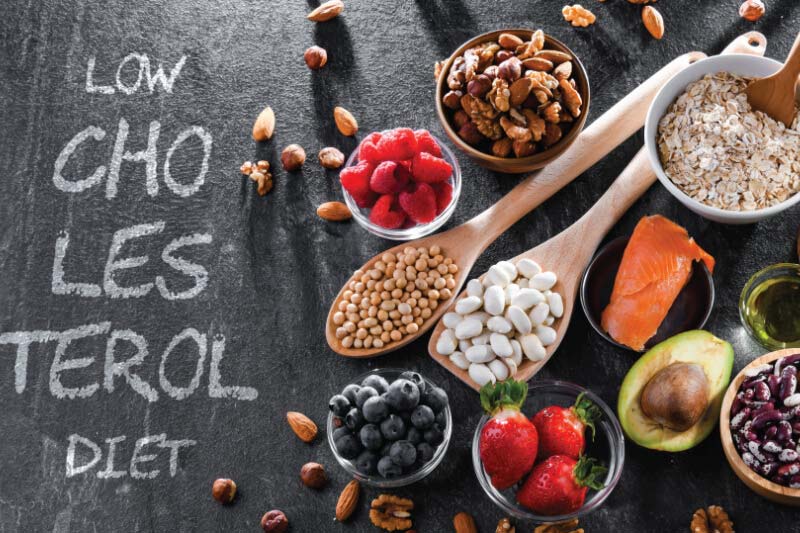Cholesterol is one of the most well-known compounds in our body, and there is a lot of misinformation about this fatty substance. There are several myths surrounding it, and to stay fit, it is essential to debunk such myths. You can increase awareness about related health conditions like heart attacks and strokes so that symptoms can be recognized and effective treatments can take place.
Cholesterol and its importance
Cholesterol is an important waxy substance in the blood that builds healthy cells. However, high levels of fatty deposits can lead to high cholesterol levels. These deposits can break suddenly and cause a clot in the blood vessels, eventually leading to a heart attack or stroke.
Cholesterol is mainly found in two sources: it is produced in the liver, and it can be obtained from various animal-based foods, including meat, poultry and dairy products. Some of these foods can also contain high levels of saturated fat. While high levels of saturated fats themselves do not directly lead to high blood sugar levels, diets high in saturated fats can contribute to insulin resistance and, consequently, high sugar levels.
The flaws in the cholesterol hypothesis
The cholesterol hypothesis or lipid hypothesis refers to elevated levels of LDL cholesterol that can lead to atherosclerosis (clogging up of arteries). Several cardiologists and lipid experts have now been examining if it is effective. This is because recent medical trials have failed to show direct clinical benefits while using drugs other than statins to reduce cholesterol levels. If the cholesterol levels were true, which drugs were used to reduce cholesterol levels would not have mattered, as any method of lowering cholesterol would have improved clinical outcomes, which is not the present scenario.
However, you can incorporate certain non-statin therapies to reduce and control LDL cholesterol. Treatments that involved these studies include:
- Niacin
- Fibrates
- Ezetimibe
- Bile acid sequestrants
- CETP inhibitors
Debunking common cholesterol myths

Here are some of the common cholesterol myths that we can explore:
Myth 1: If the food label says ‘No cholesterol,’ it’s good for you
While you can rely on food labels, you need to know what to look for. If something says ‘low cholesterol,’ it might actually be high in saturated fats or trans-fats. Even a low-cholesterol or low-fat product may have a higher fat content than what you expected. Therefore, make sure you go through the entire nutrition label before purchasing a product
Myth 2: I use statins, so I can eat whatever I want
If you eat what you want, then you will consume excess food, and you might gain weight, especially around your stomach, which can lead to metabolic syndrome, which is a prediabetic state. While consuming statins can be one of the ways to lower cholesterol, overeating and consuming junk foods can cause weight gain, resulting in an increased risk of health conditions like diabetes and high cholesterol.
Myth 3: Kids don’t have to worry about high cholesterol
One should get tested for high cholesterol as early as the age of 20. Given the changing lifestyles and poor health choices, it’s even possible for children to suffer from high cholesterol. In fact, children with high cholesterol stand a higher chance of suffering from heart disease in later stages. Parents and caregivers should encourage at least 60 minutes of physical activity to keep their cholesterol levels in check.
Myth 4: High cholesterol is not a problem for thin people
Being light-weight does not mean you will never develop high cholesterol levels. Your genetics also play a significant role in your cholesterol levels. You are more likely to develop a high cholesterol level if someone from your family already has it, even if you are light-weight.
Myth 5: The link between cholesterol and dietary fat
It’s a common misconception that saturated fat can directly impact your blood cholesterol levels, which can further lead to clogged arteries and heart diseases like attacks and strokes. However, the relationship between them is not so one-dimensional. While some unhealthy foods can increase cholesterol levels, the overall impact on your heart health can be influenced by the amount and the type of fat you eat. For example, consumption of unsaturated fats such as fish, nuts, and olive oil can improve the levels of good cholesterol and lower bad cholesterol.
Myth 6: The role of inflammation in heart disease
Inflammation is our body’s natural response to physical trauma or infection. Chronic inflammation, however, can cause a lot of damage to our body and is one of the most important factors behind most heart diseases. For example, inflammation in your artery walls can cause plaque development. Factors that contribute to inflammation include smoking, stress, and persistent high blood pressure.
Myth 7: The importance of lifestyle factors in heart health
Regularly exercising, avoiding smoking and maintaining a healthy weight are all vital for maintaining a healthy heart. Regular exercise can help maintain your body’s cholesterol levels by increasing your HDL (good cholesterol) levels. Stress management techniques are also essential as unchecked stress increases the risk of certain health conditions like obesity and increased heart disease risks, including attacks and blockages.
The benefits of a low-carb, high-protein diet

The low-carb, high-protein diet has gained popularity in recent times as an effective diet plan for a strong and healthy heart. It emphasizes consuming proteins and other micronutrients like vitamins and minerals over carbohydrates. This diet can help you manage your weight, which can positively impact your cholesterol and heart health. While the long-term effects of such diets are still being studied, choosing healthy fats and maintaining a balanced diet for overall well-being is essential.
These are just some cholesterol myths we have delved into. These should help you stay on track with your health goals. It’s always important to stay vigilant and knowledgeable of all the facts. Embracing a holistic approach to diet and lifestyle is the best way to manage cholesterol levels and support heart health. Always consult your doctor before making changes to your diet or lifestyle, especially if you have any pre-existing health conditions.
Key Takeaways
- Cholesterol is a waxy substance found in the blood that plays a crucial role in building healthy cells.
- To help lower and manage LDL cholesterol levels, consider incorporating certain non-statin therapies.
- With changing lifestyles and unhealthy choices, even children can experience high cholesterol levels.
Stay tuned to the Activ Living Community. Keep up to date with the latest health tips and trends through expert videos, podcasts, articles, and much more in nutrition, fitness, mindfulness, and lifestyle conditions like Asthma, Blood Pressure, Cholesterol, and Diabetes.
You may also be interested in the following blogs:
- How Can Plant Sterols Keep Your Heart Healthy And Cholesterol At Bay?
- The Benefits of Barley for Lowering Cholesterol and Improving Heart Health
Popular Searches
How to lower blood pressure | Fruits good for liver | Unhealthy foods | Ragi Benefits | Basal Metabolic Rate | Acupressure points for High Blood Pressure | Ayurvedic medicine for blood pressure | How to control cholesterol at home | Homeopathy for Asthma | Biological Age | Home remedies for TB | Natural beta blockers | Negative effects of internet | Types of walking | Blood pressure calculator | Blood sugar calculator | BMI Calculator





 1800-270-7000
1800-270-7000










Thank you for your support on this topic, You did a good job and you made a good site it’s very interesting one. I am very satisfied with your site and also I like your information.